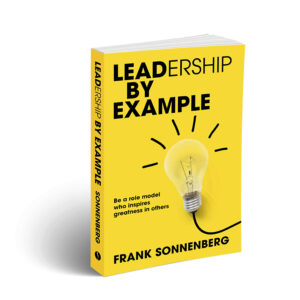To My Readers: I’m honored to republish, with permission, Ideas to Transform You from Good to Better to Best by Rodger Dean Duncan, which first appeared in the June 29, 2023, issue of Forbes. In it, he interviewed me about issues that make the biggest difference in relationships and personal performance.
— Frank Sonnenberg
Ideas to Transform You from Good to Better to Best
By Rodger Dean Duncan Forbes Columnist
A while back, I took a couple of my grandchildren on a tour of the university that granted me my first degree. We went inside the school library. Off to one side there was a display depicting the history of libraries. It was a large oak card catalog cabinet with dozens of drawers.
Do you remember those? Back in the day, if you wanted information on something, you’d shuffle through the alphabetized drawers searching for direction to books that you hoped were somewhere on the library shelves. If you couldn’t find what you wanted, you’d ask a librarian for help. In a whisper, of course.
All that seems so archaic today. We live in an age of data overload. With just a few keystrokes, we have instantaneous access to information on virtually every subject imaginable.
In that setting, it’s nice to take an occasional deep breath and reach out for uncomplicated, uplifting thinking on issues that matter most.
One of my favorite sources is Frank Sonnenberg. He’s the author of ten books and has been named one of America’s top thought leaders. His blog, FrankSonnenbergOnline, reaches more than five million subscribers. He never writes about politics or other grenade-lobbing issues that seem to consume social media platforms. His focus is moral character, personal values, and personal accountability.
Some of his recent blog posts demonstrate his focus:
“99 Ways to Be More Selfless,” “Are You Living the Life You’re Meant to Live?” “Take Ownership by Taking Responsibility,” and “13 Ways to Demonstrate Honesty.”
Do yourself a favor and resist the temptation to assume this is goody-goody pablum. It’s immediately useful to anyone who wants to be more effective in the real world of real challenges. Sonnenberg’s approach is unapologetically principle-centered in addressing issues that make the biggest difference in relationships and personal performance.
His most recent book is Leadership by Example: Be a role model who inspires greatness in others
A lot of today’s so-called “role models” are entertainers, sports figures, and social media “influencers” who—let’s be honest—embrace values and exhibit behaviors that many people would rather not be adopted by upcoming generations. In that context, how can parents and educators encourage children to focus on things that bring out the best in them?
“You send messages continuously—even if you don’t intend to,” Sonnenberg says. “And those messages are having a profound impact on people’s lives. It’s not just what you say, but what you do; when you speak up or when you turn a blind eye; when you’re friendly or when you give folks the cold shoulder; when you hold steadfast to your values or when you give in to temptation.”
Sonnenberg suggests asking yourself these questions:
- What does my attitude say about me?
- Am I proud of what I do and who I am?
- Would I be proud if my kids followed my example?
- Would I want to be friends with myself?
“If you’re a parent, teacher, coach, religious leader, neighbor, or manager, you’re influencing people every day,” he says. “If behavior is contagious, is yours worth catching?”
So, how do expectations influence—and determine—a person’s destiny?
“When people expect a particular outcome, they look for evidence to support their view,” Sonnenberg says. “In essence, if you believe the world is your oyster, you’ll pursue it with vigor. Conversely, if you think nobody like you stands a chance, you’ll quit before you even start. This can have a powerful effect on behavior and ultimately, on results.”
He offers these examples:
If you believe people are trustworthy, you’re going to manage relationships differently than if you think everyone’s out to get you.
If you believe hard work pays off, you’re going to view tough days differently than if you believe your company’s trying to take unfair advantage of you.
If you believe life has its ups and downs, you’re going to view bad days differently than if you think you’re the only one with problems.
In short, your expectations don’t just influence your destiny. They determine it.
Choices, it’s been said, are the hinges that open the door of a person’s destiny. So, what are some of the important choices that most people face nearly every day?
Sonnenberg points out that choices have trade-offs. By definition, a choice is an either- or decision. Every time you choose one direction, you’re also choosing not to take an alternate path. The key, he says, is to choose wisely. Your destiny depends on it.
Do you:
- Do what’s right or make exceptions when it’s convenient?
- Invest in your future or refuse to make the sacrifices?
- Address challenges head-on or kick the can down the road?
- Create win-win situations or aim for winner-take-all?
- Address your poor habits or make excuses for your shortcomings?
- Confront your fears or surrender to them?
- Put others’ needs ahead of your own or make everything all about you?
- Feel happy when others succeed or resent them for their achievements?
- Accept responsibility for your life or constantly rely on the good graces of others?
Choices are easy, Sonnenberg says. The hard part is living with them.
For many people, goal setting and goal achievement are among the most frequent—and stressful—subjects of concern.
“Some folks are so afraid of failing that they don’t try—and forfeit the opportunity as a result,” Sonnenberg says. “Others refuse to put their heart into things, due to fear of disappointment. Additionally, some people fail to make the hard choices. If everything’s a priority, then nothing’s a priority. As a result, important things don’t get the attention they deserve.
He says the main reason people fall short of their goals is their unwillingness to accept personal responsibility for their behavior. “They want to get ahead, but refuse to make the investment,” he says. “They want to achieve their goals but are unwilling to make the sacrifice. They want the good things in life but are unwilling to work for them. In other words, others can stop you for a moment. Only you can stop yourself for good.”
Many people struggle with time management—or perhaps we should say attention management. Sonnenberg has some insights on prioritizing things that really matter.
“Everyone has the same amount of time each day,” he says. “What you do with that time is your choice and your choice alone. When most people are faced with that quandary, they cram more stuff into their day by moving faster, getting less sleep, or working longer hours. That’s hardly the answer to your problem.”
He says the solution lies in the following three principles:
- Make your priorities a priority. Checking items off a to-do list doesn’t determine progress; focusing on your priorities is what counts.
- Subtracting from your list of priorities is as important as adding to it.
- Saying “no” to one thing allows you to say “yes” to another.
The key, he says, is that every time you do something, you’ve chosen to forgo something else. So, the next time you say, “I don’t have the time,” he declares, what you’re really saying is, “I won’t make the time.”
Much has been said and written in recent years about self-awareness and self-accountability. What role do they play in a person’s success?
Sonnenberg answers that question by asking some of his own: “What describes your way of thinking?” Are you more likely to say, “Why them and not me?” or “If they can do it, so can I?” Your answer to that question, he says, will either motivate you to reach new heights or discourage you from even trying.
“When you believe you can achieve anything you set your mind to, your faith will give you strength, hope, and confidence,” he says. “You’ll have confidence in your ability and remain steadfast and determined until you reach your final goal.” Conversely, he says, “when you believe that others hold an unfair advantage and that the cards are stacked against you, this belief will discourage you from making the effort. Instead of taking the bull by the horns and accepting responsibility for your destiny, you’ll fail to make the personal sacrifice, put in the hard work, and make the commitment required to succeed. If you believe you can’t, you won’t.”
He urges people not to believe everything they think, and advocates honest examination of the stories they tell themselves.
“We all worry about things. It’s only natural. Did you ever ask yourself whether you’re worrying for nothing? What starts out as an innocent ‘what-if’ scenario can easily spiral into a frightful experience that takes a toll on your mood and can even impact your health and well-being. The next time you worry about something,” he suggests, “ask yourself whether you’re being rational. First, take inventory of the many times your worries never came to pass. In fact, according to a study, over 91% of worry predictions don’t come true. Second, if the things that you worried about did occur, was the result as bad as you feared? You may learn that the anticipation is worse than the reality.
He suggests asking yourself: “Is all the nail biting, heartache, and sleeplessness warranted or are you overreacting? Don’t believe everything you think.”
Many people in leadership positions struggle with the age-old compliance versus commitment conundrum. Sonnenberg has an interesting take on that, too.
“Some folks assume that being an authoritarian, tyrant, bully, control freak (use any label you want) won’t come back to haunt them one day,” he says. “That may ring true if being obedient is the same as being committed. But is it? If you want obedience, get a dog. Control is an illusion. Real power isn’t the result of controlling people. It’s created by empowering folks and forging commitment, leading by example, and providing meaning and purpose. By its very nature, there’s no need to force people into compliance. If you play your cards right, they’ll manage themselves. When people follow orders, they go through the motions. But when they have a vested interest in the outcome, they follow their heart.”
To say that today’s economic and social environments are in turmoil would be understatement. For people who want to be indispensable in the workplace, Sonnenberg has some simple counsel.
“When you have superior knowledge, experience, and skills—coupled with strong moral character—you won’t have to rely on the whims of an organization,” he says. “You’ll be a tremendous asset anywhere you work. Plus, you won’t have to spend time promoting yourself because your reputation will do the selling for you.”
He offers these questions as guidelines for personal development:
- Do you make time to exercise your mind?
- Have you set goals, or is learning haphazard?
- Do you depend on others to spoon-feed you, or do you shoulder the responsibility?
- Do you view negative feedback as criticism or a gift?
- Do you limit the scope of your learning or address your knowledge, skills, experience, mindset, and moral character?
- Do you focus exclusively on things that help you today or that will benefit you tomorrow as well?
Check out Franks NEW book, Leadership by Example: Be a role model who inspires greatness in others
What Are Your Thoughts and Ideas?
Please leave a comment and tell us what you think or share it with someone who can benefit from the information
 Dr. Rodger Dean Duncan is the award-winning, bestselling author of CHANGE-friendly LEADERSHIP: How to Transform Good Intentions into Great Performance. He’s a regular contributor to Forbes.com, a platform that reaches 75 million readers each month.
Dr. Rodger Dean Duncan is the award-winning, bestselling author of CHANGE-friendly LEADERSHIP: How to Transform Good Intentions into Great Performance. He’s a regular contributor to Forbes.com, a platform that reaches 75 million readers each month.
Additional Reading:
Leadership by Example: Be a role model who inspires greatness in others
The Path to a Meaningful Life
Listen to Your Conscience. That’s Why You Have One
Soul Food: Change Your Thinking, Change Your Life
BookSmart: Hundreds of Real-World Lessons for Success and Happiness
Follow Your Conscience: Make a Difference in Your Life & in the Lives of Others
Managing with a Conscience: How to Improve Performance Through Integrity, Trust, and Commitment (2nd edition)
If you like this article, subscribe to our blog so that you don’t miss a single post. Get future posts by RSS feed, email or Facebook. It’s FREE.






Leave a Comment